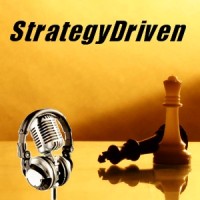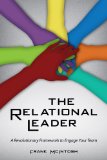StrategyDriven Podcast Special Edition 40b – An Interview with Frank McIntosh, author of The Relational Leader, part 2 of 2

Special Edition 40b – An Interview with Frank McIntosh, author of The Relational Leader, part 2 of 2 examines how a people-centered relational leadership approach breaks down organizational barriers and engages and motivates employees for achievement of truly superior results. During our discussion, Frank McIntosh, author of The Relational Leader: A Revolutionary Framework to Engage Your Team shares with us his insights and illustrative examples regarding:
the methods Relational Leaders use to hold employees accountable for the achievement of assigned tasks and goals
- the activities executives and managers should engage in to become more relational in their leadership approach
- the actions executives and managers can take to transform their company into a relational organization
Additional Information
In addition to the invaluable insights Frank shares in The Relational Leader and this special edition podcast are the resources accessible from his website, www.FJMcIntosh.com. Frank’s book, The Relational Leader
published by Course Technology PTR – a part of Cengage Learning, can be purchased by clicking here
.
Final Request…
The strength of our community grows with the additional insights brought by our expanding member base. Please consider rating us on iTunes by clicking here. Rating the StrategyDriven Podcast and providing your comments online improves our ranking and helps us attract new listeners which, in turn, helps us grow our community.
Thank you again for listening to the StrategyDriven Podcast!
About the Author
Podcast: Play in new window | Download (Duration: 31:05 — 42.7MB) Subscribe: RSS
. During his 36 year career, Frank has worked with many of the most recognized companies and executives in the world. He has provided consulting services for peers across the country and helped initiate Junior Achievement programs in Ireland, the Ivory Coast, Oman, the United Arab Emirates, Bahrain, and Uzbekistan. Frank was inducted into the Delaware Business Leaders Hall of Fame in October 2008, one of 38 individuals so honored and the first not-for-profit executive to receive this distinction in Delaware’s 300 year business history. To read Frank’s complete biography, click here.


 Dr. Diane Katz has worked with organizations, professionals for over 40 years. With a Masters Degree in Organizational Psychology from Columbia University and a Ph.D. in Conflict Resolution from Union Institute, she has applied her education to organizations large and small.
Dr. Diane Katz has worked with organizations, professionals for over 40 years. With a Masters Degree in Organizational Psychology from Columbia University and a Ph.D. in Conflict Resolution from Union Institute, she has applied her education to organizations large and small.  Sharon Armstrong, author of
Sharon Armstrong, author of  Michael Neill is an internationally renowned transformative coach and the author of the new book,
Michael Neill is an internationally renowned transformative coach and the author of the new book,